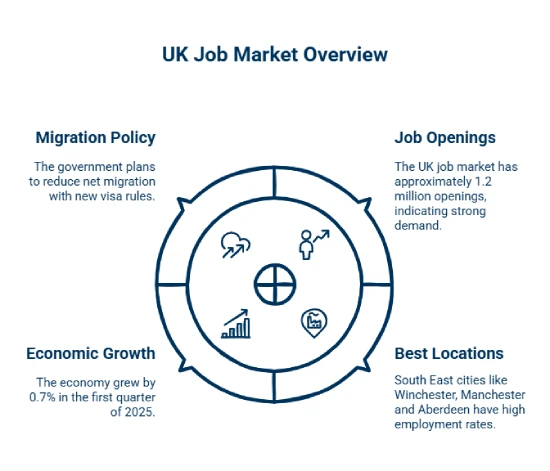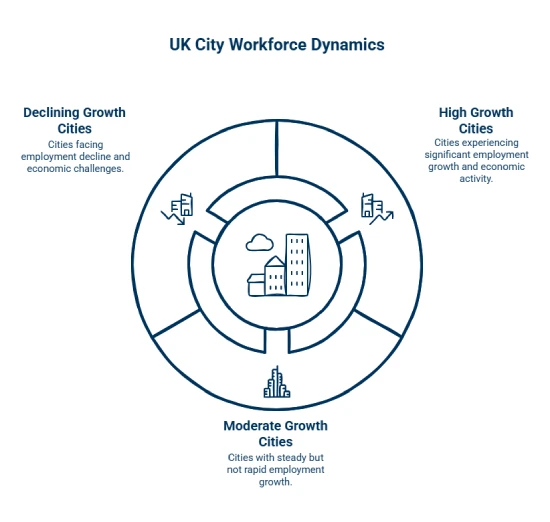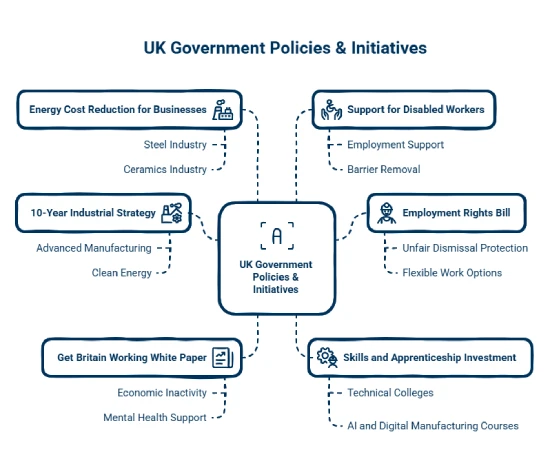
The UK job market in 2025 is going through some changes. While there are still good long-term job options out there, hiring is slowing down in various sectors. Recent HMRC data shows that the number of people on payroll dropped by 109,000 in May 2025—the biggest drop in more than ten years. Still, there are solid opportunities for skilled workers, especially in areas like clean energy, innovation, and digital tech.
The unemployment rate has ticked up to 4.6%, the highest it's been since 2021, which shows some shifts in the job landscape. On the bright side, there are over 1.44 million job vacancies in the UK, with high demand in healthcare, IT, education, and green industries. Cities like Manchester, Bristol, and Edinburgh are still busy job markets for both locals and those from abroad.
Here are some key factors affecting the UK job market in 2025:
*Want to work in the UK? Let Y-Axis guide you with the process.
The UK job market is still looking for skilled workers, especially in areas like healthcare, tech, engineering, and education. If you are considering moving here for work, jobs on the Shortage Occupation List are a good option since they have quicker visa processing and lower salary requirements for foreign workers.
| Occupations | Average Salaries per year |
| Engineering | £43,511 |
| IT | £35,000 |
| Marketing & Sales | £35,000 |
| HR | £32,842 |
| Healthcare | £27,993 |
| Teachers | £35,100 |
| Accountants | £33,713 |
| Hospitality | £28,008 |
| Nursing | £39,371 |
Read more…
Top in demand occupations in the UK
The demand for skilled workers in the UK job market differs from one city to another. Factors like the types of industries in the area, how well the economy is doing, and how many businesses are around play a major role in this category.

The table below has the list of the top 10 cities in the UK along with the average salary offered and the employment growth rate:
| City | Average Salary | Employment Growth rate |
| Milton Keynes | £38,613 | 3.90% |
| Oxford | £36,692 | 16.40% |
| York | £32,533 | 2.90% |
| St. Albans | £46,551 | 5.30% |
| Norwich | £31,559 | 6.70% |
| Cambridge | £38,666 | 4.20% |
| Colchester | £34,694 | -2.80% |
| Aberdeen | £32,239 | -6.20% |
| Bristol | £34,215 | 8.70% |
| Coventry | £33.887 | 1% |
The job market in the UK is changing fast as we head toward 2025. Employers are on the lookout for people who have a mix of technical skills and soft skills. Some key fields where jobs are available include technology, marketing, finance, healthcare, and leadership.
Given below is a breakdown of the skills that are in high demand now:
| Technology Skills | Marketing Skills | Finance & Accounting Skills | Healthcare Skills | Leadership & Communication Skills |
| Artificial Intelligence (AI) & Machine Learning | Digital Marketing & SEO | Financial Analysis & Forecasting | Telemedicine & Digital Health Proficiency | Strategic Decision-Making |
| Cybersecurity & Information Security | Content Creation & Management | Block chain & Digital Payment Systems | Patient Management Systems | Effective Communication |
| Cloud Computing (AWS, Azure, Google Cloud) | Social Media Strategy | AI-Driven Financial Modeling | Nursing & Clinical Care | Team Leadership & Collaboration |
| Data Analysis & Big Data Analytics | CRM & Email Marketing | Regulatory Compliance & Risk Management | Mental Health Support | Emotional Intelligence |
| Software & Application Development | Marketing Analytics Tools | Taxation & Auditing | Healthcare Data Analysis | Adaptability & Problem-Solving |
Note: These skills are important for anyone wanting to stay ahead in the UK job market. Companies want to see both technical know-how and good people skills to help them stay innovative and efficient.
Remote work has made its mark in the UK's job market, with many companies offering flexible options. Recent stats show about 40% of workers in the UK are doing some form of remote work, with 14% working fully from home and 26% using a mix of home and office.
This trend is especially strong in fields like tech, finance, and professional services, where digital tools make working from home easier. On the other hand, jobs in healthcare, manufacturing, and education usually require people to be on-site because they need hands-on work.
A recent CIPD survey shows that 78% of bosses are on board with remote work for suitable positions. Sectors like tech, finance, education, and consulting are at the forefront of these flexible options, allowing international candidates to work from other countries before moving.
Companies have seen the perks of flexible work, like happier employees, lower costs, and better productivity. As a result, many have changed their office setups to support hybrid work, with more than half of businesses updating their work spaces since the pandemic.
*Want to migrate to the UK? Sign up with Y-Axis for complete immigration assistance!
The UK government has introduced a set of policies to boost the economy, create jobs, and support workers' rights. These plans aim to encourage new ideas, help important industries, and make sure the job market is fair and inclusive.
Given below are the six main policies and initiatives taken by the UK government to support its employees:
This strategy is all about boosting eight sectors that are expected to grow: advanced manufacturing, clean energy, creative industries, defense, digital tech, financial services, life sciences, and professional services. The goal is to double investments in advanced manufacturing to £39 billion and clean energy to over £30 billion each year by 2035.
This bill brings in important changes to workers' rights, like protections against unfair dismissal, flexible work options, and better parental leave. It aims to update employment laws to better fit how work is changing.
The target here is to reach an 80% employment rate by tackling economic inactivity and supporting people with health issues. There’s also a £240 million plan to upgrade job centers and boost mental health support.
There’s £275 million set aside to improve technical training and apprenticeships, especially in engineering, defense, and advanced manufacturing. This includes creating new technical colleges and short courses in AI and digital manufacturing.
This plan is to help cut electricity costs for over 7,000 businesses that use a lot of energy, like those in steel and ceramics. The aim is to make them more competitive and help create jobs in manufacturing.
The government is committing £1 billion each year by 2029-30 to help disabled individuals and those with health issues find or return to work. The focus is on providing strong employment support and breaking down barriers to getting jobs.

The UK government offers several important benefits to support workers:
Note: These benefits aim to support wellbeing, maintain a good work life balance, and provide financial security for employees in the UK.
There is a lot happening in the UK job market, especially in fields like IT, healthcare, engineering, and education. But for many job seekers, particularly those from abroad, landing the right position can be tough.
Given below are some of the most common challenges faced by job seekers in the UK:

*Finding it difficult to keep your resume up-to-date? Avail Y-Axis Resume Writing Services to get personalized assistance!
Finding a job in the UK can be exciting but tricky, especially if you are coming from abroad. To increase your chances, it helps to plan ahead and know what employers are looking for. Whether you are a skilled worker, fresh out of school, or changing careers, here are some tips to get you started.
With the right planning and tools, finding work in the UK can be easier and more rewarding. Y-Axis is here to help you from evaluating your profile to guiding you through the visa process and job hunting.
The UK job market has plenty of options in fields like healthcare, IT, finance, education, and construction. There are usually more than 2 million job openings, showing a real need for workers from the UK and abroad. Cities like Oxford, Milton Keynes, and York are seeing the most job growth. If you are a skilled worker, jobs on the Shortage Occupation List can help you get a visa more easily. Right now, digital skills, flexibility, and work experience are really important, making the UK a great place for people looking for jobs.
*Are you looking for step-by-step assistance for UK Immigration? Contact Y-Axis, the leading visa and immigration consultancy in Canada!
Explore what Global Citizens have to say about Y-Axis in shaping their future
Canada PR Visa
Sameer got Permanent Resident Visa for C
Read More...
Canada Work Permit Visa
Varun provided us with great Y-Axis Revi
Read More...
Canada PR Visa
One of our client Virendra availing his
Read More...
The UK job market is experiencing a period of adjustment. As of March 2025, the total number of workforce jobs stood at 37.1 million, marking an increase of 0.5% from December 2024. However, job vacancies have declined by 16.9% compared to the previous year, now sitting 7.4% below pre-pandemic levels. The unemployment rate has risen to 4.6%, indicating a cooling labor market.
Projections suggest that the UK will see a 0.5% annual increase in jobs from 2025 to 2035, resulting in approximately 2.6 million new positions. The services sector is expected to drive this growth, while manufacturing may continue to decline. Key areas of expansion include healthcare, education, and technology.
Several sectors are experiencing significant demand for skilled professionals:
The UK job market is facing challenges amid economic uncertainties. While certain sectors like technology and healthcare continue to hire, others are experiencing slowdowns. Recruitment firms report a decline in permanent placements, and some companies are implementing hiring freezes. However, opportunities remain for skilled workers, particularly in high-demand roles.
The most in-demand jobs in the UK include:
Note: These roles are often listed on the UK's Shortage Occupation List, facilitating visa sponsorship for qualified foreign workers.
As of early 2025, the average full-time salary in the UK is approximately £37,430 per year. Salaries vary by industry and region, with London typically offering higher wages. For instance, IT professionals and engineers often earn above-average salaries, while roles in hospitality and retail may offer lower compensation.
According to the recent trends indicate a cooling labor market, with a notable decline in job vacancies and a rise in unemployment. However, significant investments, such as Amazon's £40 billion expansion plan, are expected to create thousands of jobs in logistics, technology, and infrastructure sectors.
The UK remains an attractive destination for job seekers, especially in sectors with skill shortages. However, the current labor market is competitive, and candidates may face challenges due to economic uncertainties and evolving immigration policies. Prospective applicants should ensure their skills align with in-demand roles and be prepared for a rigorous application process.
As of December 2024, approximately 20% of employees in the UK were non-UK nationals at the time they registered for a National Insurance number. This marks a significant increase from 12% in July 2014, highlighting the growing contribution of migrants to the UK labor market.
There are several factors that shape and influence the UK job market, some of which include:
Note: Understanding these factors can help job seekers and employers navigate the evolving employment landscape in the UK.
The UK job market is seeing high demand in healthcare, technology, engineering, finance, and renewable energy sectors, reflecting both economic growth and post-Brexit workforce needs.
Employers in the UK value digital literacy, project management, data analysis, AI, healthcare expertise, and communication skills. Green and sustainability-related skills are also gaining importance.
Foreign job seekers can apply through UK-based job portals, LinkedIn, or recruitment agencies. Securing a Skilled Worker visa is usually necessary for employment.
London, Manchester, Birmingham, Edinburgh, and Bristol are leading hubs for employment, offering strong prospects across finance, tech, and creative industries.
Key visas include the Skilled Worker Visa, Global Talent Visa, Health and Care Worker Visa, and Graduate Visa for international students who wish to stay post-study.
Obtaining UK-recognized qualifications, improving English proficiency, and applying to employers licensed to sponsor Skilled Worker visas can significantly boost job prospects.
The UK workplace culture emphasizes punctuality, professionalism, teamwork, and work-life balance. Flexible working and hybrid models are increasingly common.
Roles in cybersecurity, data science, renewable energy, digital marketing, healthcare, and artificial intelligence are expanding rapidly across the country.
London offers the highest salaries but also the highest cost of living, while cities like Manchester, Leeds, and Glasgow provide good job opportunities with more affordable lifestyles.
Visa sponsorship limitations, competition for skilled roles, and adapting to workplace norms can be hurdles, but upskilling and persistence often lead to success.